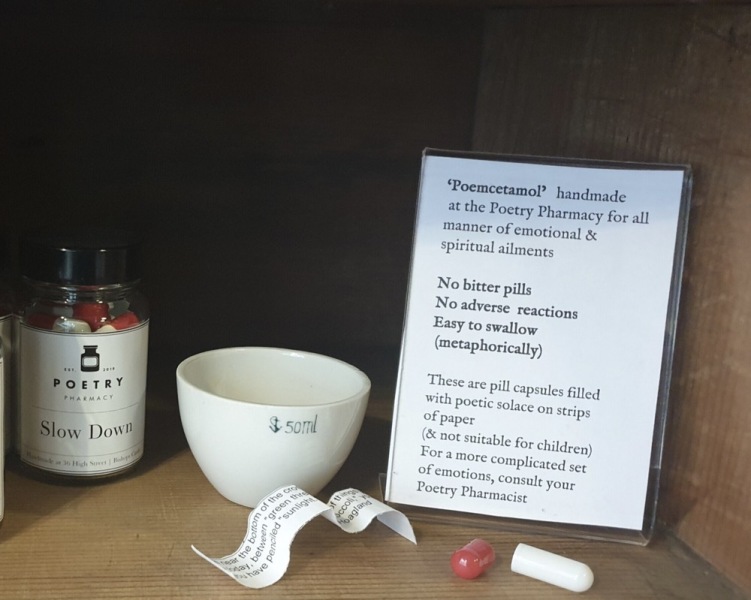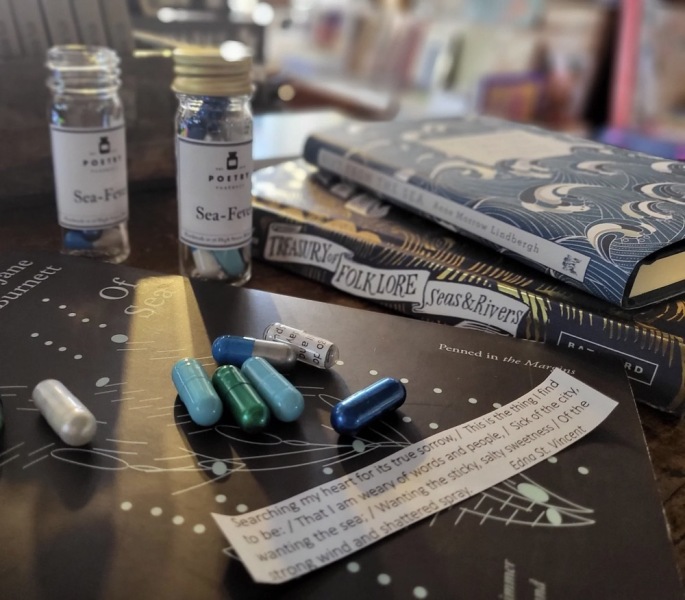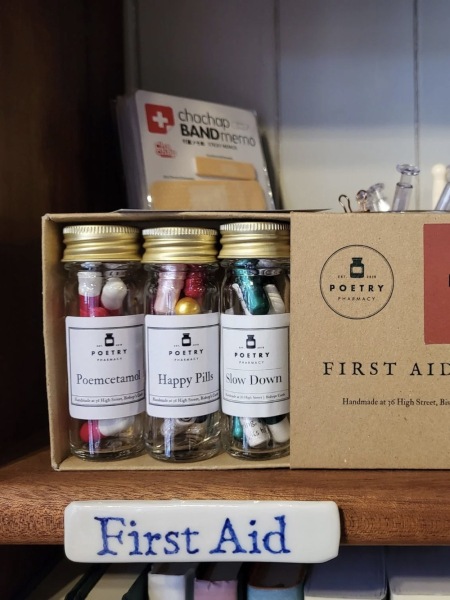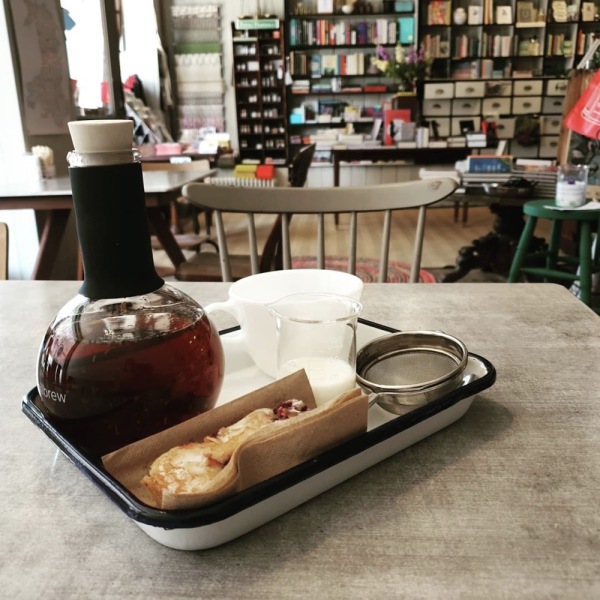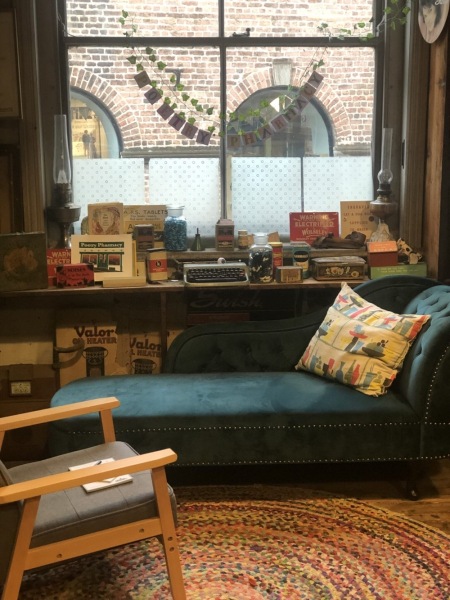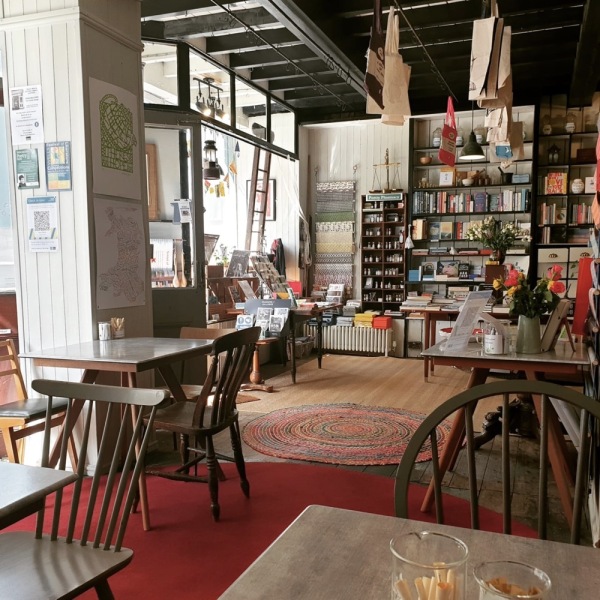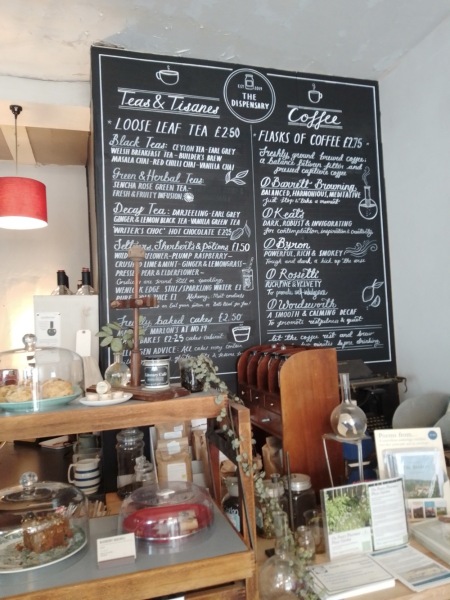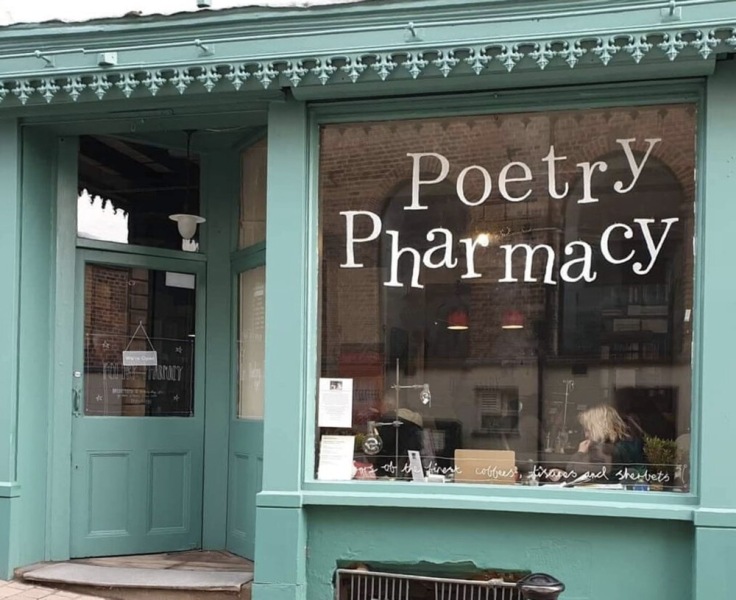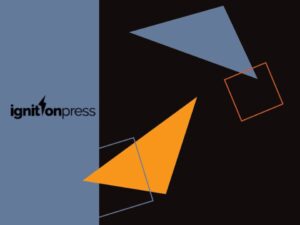We talk to Deb Alma, poet, teacher, editor, and founder of the world’s first walk-in Poetry Pharmacy and café
TFP: Before you set up The Poetry Pharmacy you travelled to festivals, libraries, schools and conferences in a vintage ambulance as The Emergency Poet offering poetry on prescription. What spurred this – why did you initially go out on the road to try to bring poetry to people? And what sort of responses did you get?
DA: I had just completed an MA in Creative Writing, and was at that painful stage at the end of a marriage. I really wanted to get absorbed in something new. I saw the ambulance for sale on ebay, and it all came together in a ‘eureka’ moment!
I had been mentored by the poet John Killick in his groundbreaking work using poetry to assist communication with people with dementia and with people in care homes and other health care settings. While doing this work I learnt that poetry could be a bridge of connection and intimacy with others. I learnt just how much people enjoy being listened to, and how a series of leading questions can profoundly affect someone’s mood. It was a massively effective combination – the valuing of an individual’s words to such a degree that you write them down, the empathy and elevation inherent in working with poetry, and how the delightful questioning can feel like a ‘massage of the mind’. I also had an evangelical zeal to overcome the widely held view that poetry is inherently ‘difficult’ or ‘not for the likes of us’.
Right from the outset I was amazed at just how much people loved the idea and the consultation. It seemed to work! Each event led to an other two bookings and I was able to give up my ‘sensible’ job;
TFP: At the time – back in 2011 – you were a low-income single parent, and you bought the ambulance with an overdraft. Was this risky? Looking back, would you have done anything differently?
DA: I don’t think it was terribly risky, despite lots of my family and friends advising me against it. I had low expectations of it being successful in any way, and thought that I could always sell a slightly improved vintage ambulance if it all went wrong. My fear was being involved in an accident where the ambulance was written off entirely and I wouldn’t get my money back. As for doing anything differently, I should have bought an 1970’s ambulance in the first place, but I was seduced by the beauty of a 1950’s Morris ambulance. This spent most of the time travelling on the back of a trailer and taking all of the money I was paid for working at festivals.
TFP: You set up The Poetry Pharmacy in an old Victorian ironmongers at the top of the High Street in Bishop’s Castle, Shropshire. The place looks great – eclectic, cosy, friendly. You’ve kept the original mahogany counter and till, used natural light to the full, and painted the walls in muted colours. I can imagine spending hours there, browsing the shelves or reading in the café while sipping a cup of Tea (S Eliot) and eating a piece of Philip Parkin cake (you promise, and deliver, a lot of bad puns). Is it how you imagined it would be when you first peered through the old shop window?
DA: The idea for the Poetry Pharmacy was very much inspired by the building itself and my response to it. And the look and feel of the place was there fully formed in my imagination. I did imagine that I would be a genteel bookseller drifting about the bookshelves, but running a coffee shop, designing and developing our own products and with the media attention that we got right from the start, has meant it has been in-at-the-deep-end exhausting!
TFP: And can you say something about the coffee? (Byron, Wordsworth, Rossetti …).
DA: We call the coffee shop The Dispensary and freshly ground coffee is served in chemistry lab-like flasks. The coffees are named for some of the Romantic poets, as they more-or-less match the age of the building, and I wanted the place to look like it had been a Poetry Pharmacy for 150 years.
TFP: To help fit out The Poetry Pharmacy you launched a Kickstarter, and 387 backers pledged £15,907 over 30 days in May 2022 – you clearly had quite a lot of interest and support. Did you get ACE funding for it too? Were you confident that it would be a success?
DA: Friends in the poetry community are absolutely what made this project happen. We nearly didn’t get a mortgage and it nearly didn’t happen, but a few kind people offered to lend us some money if that might help. My partner James Sheard and I didn’t feel comfortable accepting this, but their belief in it made us think again and gave us the confidence to actually push-on and take on the (frankly not very good) interest only mortgage that we have now.
This was the catalyst to action. We are eternally grateful to those friends and supporters. The Kickstarter paid for rewiring, plastering and heating. We were successful too with a small ACE grant which paid for workshop tables and chairs and a printer and got us set up. I think somewhere deeply I believed that it could work. I had to try. Because we live here we have no rent to pay (just the stupid mortgage), so we had the luxury of the experiment.
TFP: You offer consultations inside the Poetry Pharmacy – you have a gorgeous turquoise velvet chaise longue in the consulting room – where you listen to people talk about what is ailing them and prescribe them poems as cures, as well as dispensing ‘poemcetamols’ and other poetic pills and treatments. What do you think poetry can cure people of, and how does the process work?
DA: The ambulance and then the velvet chaise are deliberately set up to include an element of theatre, a self-conscious pastiche of a kind of Freudian therapy session. This sets up expectations that the experience will be generally light-hearted and not too intense.
The questions are designed to set up intimacy without being invasive and all are a little left-field and a pleasure to think about and to answer. I take people through questioning to moments where they are at the best, most contented or most hopeful. It’s only at the close of the conversation where they might be invited to ask for a prescription for what ails them. And the poems I choose for them are a gift that might answer that question.
The idea of poetry as cure would be part of the Quack Doctor-like set up, but aside from that, I do believe that poetry can address something that might be lost, or hurt, or confused in someone
The idea of poetry as cure would be part of the Quack Doctor-like set up, but aside from that, I do believe that poetry can address something that might be lost, or hurt, or confused in someone. The questions and the poem seem to collectively ask the ‘patient’ to be self-reflective in a good way. A poem might perhaps lead the way, or shine a light; might bring comfort, inspiration, or encouragement – whatever is needed, in a gentle dose.
TFP: Can you give me a few examples of the questions you actually ask?
DA: The questions are a little bit of a trade secret, so that the consultation acts as a surprise for the ‘patient’ but they are generally around ideal places to sit and read or be contemplative; how and when they relax; how and where they might express themselves creatively; favourite books if they are a reader.
TFP: When you do a consultation, exactly how do you choose the right poem for that person’s state of mind? Do you find yourself prescribing the same poems over and over, or a wide variety of poems?
DA: I listen very carefully. The questions are designed to give me a sense of their reading habits and literary tastes. I learn from their answers whether they are looking after themselves in a particular place, if their life is stressful or in balance, if they are at a point of change, or if they have come to see me with a need to say something. I pick up clues about favourite places, whether it’s the sea or the countryside or the city, and try to match poems that show that I have listened. Then they feel the poem is especially for them. If their ‘ailment’ is a broken heart there are poems for that; if it’s anxiety there are poems for that. I do have a few poems that work like a wonder-drug for most emotional ailments though!
TFP: Can you say what one or two of these poems are?
DA: I think the poem I most often prescribe is Seamus Heaney’s ‘Postscript’ which seems to remind readers of the importance of stepping out of their everyday life, and of the value of space and air and nature, and also of liminal spaces. It encourages readers to find a place to pause and breathe in order to allow for inspiration, or change. For a broken heart I most often prescribe Derek Walcott’s ‘Love After Love’.
TFP: You have a few lines from the poem ‘Incantation’ by Alexander Hutchison on the wall – does this poem hold special meaning for you?
DA: Ah I do love that poem. It feels so right for this space and I was very honoured to have been given permission from Alexander’s widow Meg Stiven who was delighted that we were going to use the poem in this way.
I have a charm for the bruising
a charm for the blackening
a charm for cheats and impostors …
Read ‘Incantation’ by Alexander Hutchison on the Scottish Poetry Library website
TFP: What sort of events do you run from The Poetry Pharmacy, and can you tell us about some of your best experiences
DA: I’m very proud that we have become a small centre for poetry and other arts activities here in the middle of nowhere in the Shropshire Hills. We host various workshops, book clubs and book groups, book launches, readings, an open mic’, lend out our Writing Hut in our Physic garden, and share our poetry reference library and working space; as well as some training events, work with colleges and my consultations.
My own favourite moments are when the whole place is a hive of activity: a workshop going on upstairs in the morning, a book club meeting in the garden, a birthday tea in the coffee shop and me giving a consultation in the Writing Hut all on one day. I love giving people the opportunity to read for the first time or run their first workshop, or collaborate with us in some way. The community of it all is working and I’m very proud of that. It goes back to your question about the Kickstarter and the community; I hope I’ve lived up to their faith in me.
TFP: Do you get any time to work on your own poetry? Your first full collection Dirty Laundry was published by Nine Arches Press in 2018 – do you have a second one in the works?
DA: The simple answer to that question is No. All my creative energy and most of my physical energy is used up in the Poetry Pharmacy or in books that I’ve had the pleasure to edit recently. I have some poems that move at a snail’s pace towards a possible second collection. Maybe when I’m in my 80s …

